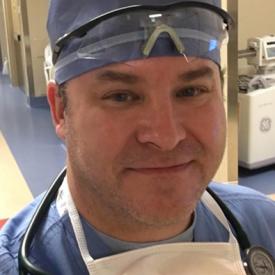
Creighton’s EMBA tackles VUCA world

In 1987, a baby joined the crowded world of acronyms.
“VUCA,” standing for “volatility, uncertainty, complexity and ambiguity,” has since achieved prominence as a branch of leadership studies that emphasizes anticipating challenge, speedy and effective response to setbacks, adaptability to changing conditions and empowering employees and co-workers to successfully manage change.
Developing expertise in VUCA, a powerful tool in addressing an increasingly complex, unpredictable and global world, is an important component of Creighton University’s Executive MBA in Healthcare Management (EMBA). It’s a component of the University’s overall healthcare management program that Joe Billig, MD, MBA’19, says answered his desire for a degree in healthcare management and took his career to a new level.

Joe Billig, MD, MBA’19, an anesthesiologist and regional medical director with Colorado Permanente Medical Group in Denver, says Creighton’s multidisciplinary Executive MBA in Healthcare Management (EMBA) has taken his career to a new level. How can it do the same for you?
Tailored to busy, working physicians, clinicians, hospital administrators and healthcare executives, Creighton’s Executive Healthcare MBA program from the Heider College of Business offers a flexible, credible and relevant graduate degree to help students improve their leadership skills and build their careers.
“I didn't really know what to expect when I entered Creighton’s EMBA program,” Billig says. “My expectations were somewhat muted, but I will say they were far exceeded by the things I learned about myself, about my peer group, and about the healthcare industry in general. Because of it, I am a much more effective physician-leader than before I entered the program.”
Billig, an anesthesiologist, serves as regional medical director with Colorado Permanente Medical Group in Denver, a physician group that provides healthcare to more than 600,000 Coloradans.
The group’s management team must anticipate challenge, he says, and be nimble in response. In other words, it must be VUCA-competent.
The concept of VUCA originated with the Army War College where, in 1987, instructors used it to describe the dynamics of warfare. It eventually made its way into the business arena where it is used to define a business environment made volatile, uncertain, complex and ambiguous by the rapid pace of change in modern economies.
The Harvard Business Review has defined the components of VUCA in the following manner:
- Volatility: The challenge is unexpected or unstable and may be of unknown duration, but it’s not necessarily hard to understand; knowledge about it is often available.
- Uncertainty: Despite a lack of other information, the event’s basic cause and effect are known. Change is possible but not a given.
- Complexity: The situation has many interconnected parts and variables. Some information is available or can be predicted, but the volume or nature of it can be overwhelming to process.
- Ambiguity: Causal relationships are completely unclear. No precedents exist; you face “unknown unknowns.”
The challenges of the early 21st century, ranging from economic crises to a global pandemic, have brought VUCA studies to the fore.
“A year ago, if you had told me that at Christmas 2020 restaurants will close, people will be out of work, there will upheavals across society and kids will be watching TV for school, I wouldn't have believed it, but it's true,” Billig says.
“Understanding that adapting — and adapting very quickly — to such upheavals, and perhaps making significant changes in your organization, is key to being successful and gaining a competitive edge.”
A graduate not only of the Creighton University Heider College of Business, but also Creighton Preparatory School, Billig is an Omaha native whose appreciation for the Jesuit values embodied in a Creighton education runs deep.
His passage through Creighton’s EMBA program and with other EMBA students, granted a heightened understanding of how healthcare works, he says, and enabled him to see beyond the perspective of a physician.
“At Creighton, we talked a lot about the greater good, what we call the magis,” he says. “The greater good has to be part of the equation. A key tenet of Ignatian values is being a person for others, and I think that idea drives most people who get into healthcare.
“That’s the onus that we have to carry forward — finding God in all things and all circumstances, which are two more Ignatian values. If you set your goal to make good decisions for the greater good, then you will stay on the right path.
“As a healthcare leader, it's the same thing. If you are supportive of your people, who are motivated to help other people and want to do some good in this world, if that guides your decision-making, then you will be successful even in this crazy, VUCA world.”
Who Should Get an EMBA?
Creighton's EMBA program has a robust and credible curriculum, designed around two of the most admired professional associations in the healthcare industry: the American College of Healthcare Executives and the American Association for Physician Leadership. With instruction from respected faculty, students are well-prepared to complete either organization’s respective certification exam processes.
The EMBA is ideal for physicians and mid-career healthcare professionals who seek a graduate degree in healthcare management and have the goal to perform at a higher level in a growing and competitive field. Ideal students for this program include clinicians who manage departments, physicians who aspire to departmental or organizational leadership, are serving on organizational leadership committees or manage private practices or other ventures.
This program is a hybrid of both on-campus and online instruction to allow maximum flexibility for professional schedules.
As a professional program, the Executive Healthcare MBA is offered in a cohort-based, hybrid format. The program is 18 months long, involving 45 credit hours and four, four-day on-campus residencies.
“Creighton is very values-centric,” says program director Laurie Baedke. “We focus on rigorous academic preparation, but also on the formation of the individual person. We equip leaders with the critical skills necessary to serve their organizations and their communities very effectively.”
If you're still exploring your path, start with our career development course, Executive Fellowship in Healthcare Management, designed for the experienced healthcare professional who desires a condensed, yet broad and comprehensive overview of the business of healthcare. In just six months, participants will come away with valuable tools and insights necessary to succeed as a leader in healthcare while earning six graduate credit hours and 72 accredited CME hours.




